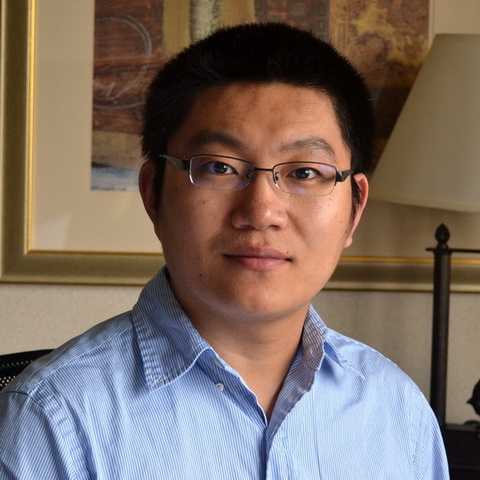Zhang Receives 2023 DARPA Director’s Fellowship to Improve Robot Teamwork

Fellowship will extend project to increase resilience, robustness in multi-robot systems
Hao Zhang, an associate professor in the Manning College of Information and Computer Sciences (CICS) at UMass Amherst, has been awarded the U.S. Defense Advanced Research Projects Agency (DARPA) Director's Fellowship. The prestigious prize is awarded to only the top performers among recent recipients of the DARPA Young Faculty Award (YFA), a program established to encourage young scientists to pursue high-risk, high-reward research that could result in breakthrough technologies for national security.
"We are immensely proud that Professor Zhang has received the highly competitive Director's Fellowship, the first time a UMass Amherst computer science faculty member has received this honor," says Erik Learned-Miller, chair of the faculty in CICS. "In his brief time as a robotics faculty member in CICS, he has shown impressive leadership in the area of human-inspired robot adaptation. We look forward to seeing the results of the next phase of his work."
Zhang's 2021 YFA Award provided $495,705 in funding for two years. The Director's Fellowship will provide an additional $406,328 to extend his research for one year.
Zhang's DARPA project, "Autonomous Group Introspective Learning and coopEtition (AGILE) for Cross-Capability Multi-Robot Adaptation," uses lessons from the social psychology of humans to help teams of robots with different capabilities work together and adapt to complex situations. To accomplish this, the research team is focusing on two main areas--group introspection and cooperative competition, or what Zhang calls "coopetition."
Group introspection would allow robots in a team to be aware of all their other team members, so they have a shared situational awareness of the overall team's capabilities. To accomplish that in robots, Zhang and his team are modelling robots in a team as a graph to enable team awareness, and are using conditional models that identify backup robots with similar capabilities to replace failed teammates.
The team is realizing coopetition by simultaneously modeling cooperation at the team level and competition at the individual level. Cooperation tackles tasks that are infeasible for individual robots to solve, while competition encourages each robot to perform better and adapt faster.
Zhang, who runs the Human-Centered Robotics Lab at UMass Amherst, says he has been amazed at his team's progress over the past two years.
"With the help and enthusiasm of our graduate student team and the support of our DARPA mentor, we have been able to meet our project goal to develop the very first paradigm in robot coopetition, and developed and demonstrated algorithms for introspection," Zhang says.
The project could result in a more resilient and robust manufacturing environment for industries that are currently big adopters of multi-robot systems, including the aerospace industry, he says. Additional applications could include transport, reconnaissance, search and rescue, and wherever else it would be beneficial to have groups of robots perform diverse complex tasks.
"The Director's Fellowship will allow us deploy our introspective coopetition approaches in additional trials and start the process of transferring this technology to real-world robot situations by developing a full-stack model that could be used by industry or the Department of Defense," he says. "I am grateful for the recognition from DARPA that we are the right track and for the opportunity to see this project through."
In addition to the DARPA YFA and Director's Fellowship, Zhang is the recipient of a National Science Foundation CAREER Award. While an associate professor of computer science at the Colorado School of Mines, he received the university's Excellence in Research Award. Zhang received his doctorate from the University of Tennessee Knoxville in 2014, his master's from the Chinese Academy of Sciences in 2009, and his bachelor's from the University of Science and Technology of China in 2006.